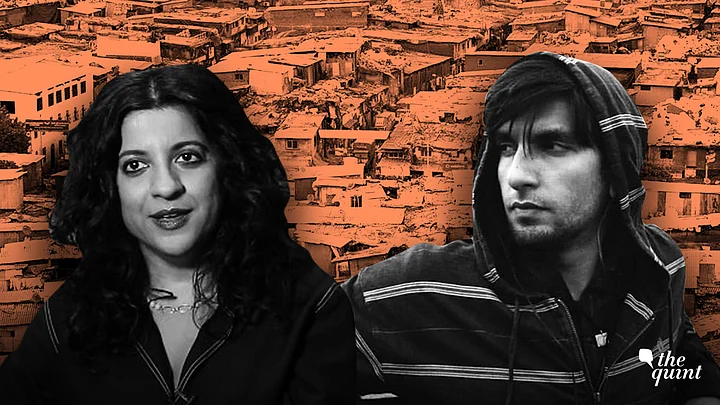Gully Boy has been celebrated long before it hit the screens on 14 February. Its release has only validated this celebration, fuelled by euphoric reviews. The collective stars awarded by critics can form a constellation in the sky that spells “apna time aayega”.
Gully Boy is a worthy film. No questions there. But, is it without its shortcomings?
Perhaps not.
In the deluge of ecstatic reviews by cinegoers and critics alike, it is wise to take a step back and isolate the layers of the film. We know what the film is trying to say. But the question here is – what is the film ending up saying ?
This review, or rather counter-review, offers an alternate interpretation and in doing so asks questions, which perhaps Ranveer Singh’s Murad would have asked if he had watched the film.
Let’s go.
CAUTION: SPOILERS AHEAD
"Gully Boy"
The film strives to tell the story of a man in search of his voice and expression. In doing so, he is also on a quest to find himself and his identity. His rapper name “Gully Boy” lends him that identity. However, it is not him who comes up with it, but the white western girlfriend of his friend MC Sher when Murad timidly says “apan gali ka chhokra hain”.
There is an instant consensus in the room when she casually offers “Gully Boy” as an option. While there is nothing wrong with the name itself, it ultimately depicts an “outsider” deciding the identity of a Dharavi resident, robbing Murad (desire) the chance to even come up with his own name.
"Mere Gully Mein"
Among my favourite scenes in the film is one where a group of westerners, armed with cameras and selfie sticks, led by a tour guide, is walking through the labyrinthine alleys of Dharavi, Asia’s largest slum.
The guide then leads them to Murad’s modest house, in what appears to be a regular arrangement at making a quick buck from the p-aww-verty-struck westerners. The unapologetic invasion of privacy is at once comic and grotesque.
The scene, however, is meant to illustrate that even basic privacy comes at a price. While the haves can ‘afford’ a private life behind gated societies and guards, the ‘have-nots’ have little claim to it.
CUT TO forty minutes ahead in the film. Murad has met SKY, a US-based music student, and they are producing a video together. When Murad innocently asks where they will shoot the song, she nonchalantly responds with “tumhare gully mein”. The jarring note lies in the fact that Murad wasn’t asked if they could shoot in his “gully” but was rather informed.
This seemingly innocent suggestion immediately reeks of the same violation of privacy into the lives of Dharavi residents by those who have little idea or understanding of its dynamics.
Happy Vandalism
There is a lengthy set-piece segment where SKY and Murad, now friends, take off on a night of vandalism where they spray-paint over offensive advertising and political posters. There’s nothing wrong with spraying over the problematic messages of fairness creams t with “brown and beautiful”.
However, there is a discordant note in the consequences of a wealthy upper-class individual in an expensive car out on a defacement spree and a youth from the ghetto doing the same. A line in Mere Gully Mein says “Ah police aayi lagi waat Mere gully mein”.
Once again, SKY and her friends’ relative clout in the social hierarchy affords them the luxury of breaking the rules and claiming “ye art nahi jung hain” for even if caught, they’re likely to get away with, perhaps, a proverbial “rap on the knuckles”.
Murad, who works as a chauffeur for a wealthy family, is now in the backseat of another wealthy individual’s vehicle. The duo might be in the same car, indulging in the same act of vandalism. However, as a line from the track Doori goes:
Ab dekho toh hum paas lekin Socho kitni doori hai
Ab kaisi yeh majboori hai Socho kitni doori hai
Conquering the Villain
The film packages itself as a classic underdog story and within that mould, it endeavours to draw the viewer not so much into what it is trying to say but rather how it is narrating the protagonist’s arc. Viewers can probably predict that Murad will emerge triumphant at the end, as is the case with all films within the genre. What Akhtar concerns herself with, then, is HOW the triumph is achieved.
The lyrics and angst enveloped within the words of Murad’s hip-hop is clearly aimed at the chasm between the classes when he raps Jitna kaala tera mann Utna kaala tera dhann in Doori . Surprisingly, there is precious little in the film portraying the crushing weight exerted from the classes above.
While the older generation like Murad’s father and his uncle are resigned to the notion that “naukar ka beta naukar hi banega”, Murad does not subscribe to this thought. He believes that “shabdo ka jwala meri bediya pighlayega”.
However, while the film instils Murad with a simmering rage against the injustices perpetrated by the class divide, the film itself steers clear of portraying the privileged class as manipulative and oppressive. To that end, there is no “villain” in the film then, except for perhaps, Murad’s father and uncle.
As Baradwaj Rangan accurately sums it, “instead of killing the villain, he conquers his circumstances”.
Eventually then, even though Murad may come across as waving his fist (rightfully so) at a deeply prejudiced society, he risks coming across as Don Quixote waving his sword at the windmills.
